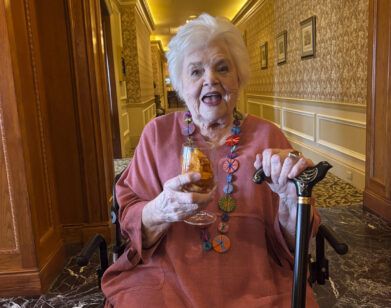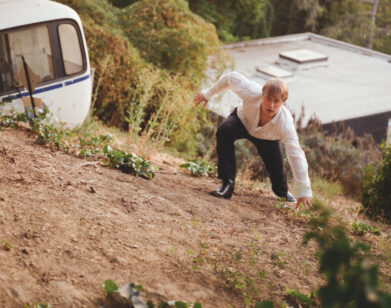SUNDANCE
Theda Hammel on Gay Guy Purgatory and the Perils of Tap-To-Pay
Last week, I had the most wonderful conversation with Theda Hammel, the filmmaker, musician, and longtime NYMPHOWARS co-host whose new film, Stress Positions, debuts at Sundance Film Festival this week. I was so struck by this one sequence in particular, towards the end of the film, an image that so perfectly captures all the ironies and hypocrisies of the Fire Island-going subset of what scholars often call “gay guy world,” that I think it truly belongs in the archive. I don’t know which archive, but definitely one of them.
Unfortunately, right after we got off the phone, Hammel realized that basically everything we’d talked about over the course of our discussion takes place during the film’s climactic final act, meaning that the interview would entirely spoil the movie for anyone who read it. We ended up scheduling a redo, which thankfully yielded an even more wonderful conversation than the first.
A comedy of manners set during the early months of COVID lockdown, Stress Positions stars Hammel herself alongside comedians John Early and Amy Zimmer, as well as newcomer model-turned-actor Qaher Harhash. Among other things, it brilliantly satirizes a certain bourgeois tendency towards yearning for connection while simultaneously avoiding strangers at all costs, unless that interaction can be safely mediated through a service like Uber or Grubhub. “I do feel like the tap-to-pay thing is really socially wretched,” said Hammel during our rescheduled interview about her characters’ utter reliance on apps to eat and go places. “Contact-free payment is symptomatic of a wish to not have contact with anybody at all. But this tendency was already in the culture already; COVID just exacerbated it.” Elsewhere, we discussed what it was like to make an early-pandemic period piece, Roland Emmerich’s flop historical epic Stonewall, and how she managed to get ahold of a disco ball used in Beyoncé’s as-yet-unreleased Renaissance visuals.
———
THEDA HAMMEL: Hi, Harron.
HARRON WALKER: Hey, Theda. You just got out of another interview, is that right?
HAMMEL: Yeah, I’m getting better at it. That’s why we’re redoing this one.
WALKER: So, I can tell the public about that forbidden first interview we did?
HAMMEL: I felt like we had a very substantive and pleasurable conversation that was all about the last 10 minutes of the movie. And in the interest of not spoiling it, we’re redoing it.
WALKER: Yeah, I really shouldn’t be telling the readers about the aliens beaming down in the last 10 minutes and destroying the White House.
HAMMEL: A lot of aliens, a lot of blood and guts.
WALKER: It’s such a great blockbuster, Stress Positions. Just full Jerry Bruckheimer boots.
HAMMEL: Well, it’s such an honor as a trans woman to be able to test myself against the Roland Emmerichs of the world.
WALKER: Oh, my god. Have you ever seen Roland Emmerich’s Stonewall?
HAMMEL: I never did. Did it speak to your experience as a member of the LGBT community?
WALKER: No, but it was really funny. It was me and maybe eight other people in the theater. The whole theater erupted in laughter when the main character, who they’d fully invented, this gay white guy named Danny from Indiana, gets homophobia’d out of his high school because he sucked one too many dicks, as in literally one dick. And then he throws the first brick at Stonewall—the literal first brick at Stonewall—hops on a cop car, and yells, “Gay power!” All of us just had the time of our life laughing at that.
HAMMEL: He really throws the first brick in the movie?
WALKER: Yeah. I think it ironically did end up being a very queer film because it functioned as pure camp in the Sontag sense.
HAMMEL: There’s something very relatable and appealing about the gap between what one sets out to do and what one actually ends up doing in their creative work.
WALKER: Well, what did you set out to do with Stress Positions?
HAMMEL: I just wanted to get through each stage of it without totally falling apart. In that respect, I succeeded, and I’m pleased with the result. But I guess what everybody wants to do is to make some sort of spectacular, amazing work of cinema, and then in trying to make it not horrible, you end up settling for what is actually a watchable and funny movie, and that process is a very welcome one. It’s the process in which one moves from being a cinephile to actually making a movie. Before you go through all of that, you have all of these illusions about who you are and what you like. At the end of it, you have a better idea of what your actual strengths are.
WALKER: So has the process of making this film shaped what you’re hoping to do with your next project? Is there even a next project?
HAMMEL: There’s nothing currently, but I’ll be at Sundance for 10 days so I’m hoping to spend the last six days in my hotel room working on something, maybe going out at night to get plastered.
WALKER: Is this your first time at Sundance?
HAMMEL: Yes. We had a short film there a few years ago, but it was shut down from the Omicron resurgence.
WALKER: Right, My Trip to Spain. One thing I really loved about Stress Positions was how you establish it as this early-COVID period piece without even needing to say when it takes place. You have characters in the very beginning Clorox wiping their delivery food. They’re spraying dollar bills with disinfectants before handing them to a courier. What made you want to keep coming back to this period with your films, since My Trip to Spain also took place in that early-quarantine, pre-vaccine 2020 moment?
HAMMEL: The thing is that it’s an apocalyptic scenario that doesn’t require you to change any of the scenery of daily bourgeois life. Some part of the world’s innocence has been lost in this crisis, but everything looks functionally the same for somebody in Terry’s position, the lead character of the movie. He’s living in a house, he’s getting food delivery, he’s on his phone. The sun is shining, but some part of the world has gone totally wrong, and it informs every component of his daily life. It has this undercurrent of dread that I think is nice.
WALKER: I think you did a great job of showing how all the characters react to the same unthinkable shared experience. Like, John Early’s character, Terry, is responding to the pandemic in a way that’s very discordant with how your character, Carla, or Qaher’s character, Bahlul, does. With Terry, it really sets off his catastrophic thinking and sense of cognitive dissonance because to him, he’s the only one taking COVID super seriously.
HAMMEL: For people like Terry and Carla in their comfortable American milieu, there’s always been a sense that horrible things are happening elsewhere. That’s part of being self-aware in the modern world. So if you’re going around and everything sort of looks the same—the supermarket is still well-stocked, people are still going out at night and dining in restaurants—you’re free to imagine the crisis to whatever extent you’re inclined to do. So if you’re a very anxious person, it lives with you at every moment, but if you’re a more flippant person or if you’re distracted by the things in your daily life, then maybe you don’t think about it that much. But there are moments of crisis when it impinges on your life in an undeniable way, like when the sky was full of smoke during the Canada fires.
WALKER: Yeah, we moved on from that really quickly.
HAMMEL: It happened in 2020 as well on the West Coast. You can’t escape the sense of doom in that moment, but then the smoke clears and you want to forget about it as soon as possible, and you do. I think that happened with the lockdown as well. Some people took it more seriously than others, but once it was officially over, there was a strong wish to return to normalcy. So it’s good to have a little bit of a record of the sky being on fire or of people being in lockdown.
WALKER: Is there any behavior of your own that feels very particularly of that 2020 moment that you’d never engaged in before?
HAMMEL: I live a very low-stakes life, so when something serious suddenly happens, it’s almost electrifying. I was in great shape, reading a lot, acquiring new skills. Everybody was doing that stupid bread thing. I never went through a bread thing.
WALKER: Yeah, everyone got really into Bon Appétit just in time for them to get canceled.
HAMMEL: I mean, there is a through line in the movie to Bon Appetit. If you look at the whiteboards throughout the movie, Terry is constantly trying to cook recipes from the Bon Appétit test kitchen.
WALKER: I totally missed that one.
HAMMEL: It’s never going his way.
WALKER: That’s kind of established from the very first shot, where Terry’s just rolling a disco ball down the stoop of a brownstone in Brooklyn to put it in the trash. I felt like that told me everything I needed to know about the state of his life even before I learned about the dissolution of his marriage.
HAMMEL: Yeah, John said, “This was very effective. Party’s over.”
WALKER: Just seeing the way that the disco ball shattered light all over the entire block was calling attention to his sad state of affairs. As a filmmaker, would you say that—
HAMMEL: That disco ball, by the way, is Beyoncé’s disco ball.
WALKER: Stop it. Wait, from when? How?
HAMMEL: I’ve never seen the video of it, because it was from Renaissance visuals.
WALKER: Oh, no one’s seen the video.
HAMMEL: There’s a little flash of a clip of it, but they sold it to a warehouse that resells film props. It was $600, and we heard that it was Beyoncé’s disco ball from Renaissance.
WALKER: Oh, my god.
HAMMEL: So it’s a little bit of Beyoncé in there, and that’s unattributed. She might object to having it appear in our movie, but we did buy it legally.
WALKER: So would you say that Stress Positions is the Renaissance visuals that everyone’s been waiting for?
HAMMEL: In more than one way.
WALKER: Possibly even two. Did you have a favorite track on Renaissance, or did you listen to it at all?
HAMMEL: Yes, I do. “Heated” is one of the best songs I’ve ever heard. What I like about it is how the end is embedded in the beginning. I can think about it for hours. The song is happening and you hear the talk down from the end bubbling up under it. It’s being prefigured under everything. And then at a certain point in the song, it surges forward, like a sleeper in a race who has been saving their last bit of energy. I find that very dramatic. It’s like the ending is buried in the beginning at all times. There are some things like that in this movie. There are key sound effects from the very end of the movie that appear in the very beginning of the movie and vice versa. It’s always referring back to the same big sound.
WALKER: I can’t wait to watch the movie again and keep my ears peeled.
HAMMEL: I’m revealing little Easter eggs.
WALKER: You’re so visually funny as a filmmaker. Are there any particular influences that have informed your visual storytelling?
HAMMEL: I like slapstick. I don’t know exactly where it comes from, but I’m sure I’m stealing it from someone. I know I’m not originating this style of visual joke-telling. But I do think that there is a quality in certain filmmakers where it’s a witty image versus a beautiful image.
WALKER: What is the difference between those two, would you say?
HAMMEL: I think an image being potentially witty has to do with what it’s concealing at any given time. So, in a beautiful image, the attention is being funneled toward the center of the image, and your eye is being stimulated by all this visual splendor. In a witty image, there’s a world offscreen, and maybe to punctuate the moment the camera can look down and see an object, like the piece of chicken on the floor. Or there’s a bit in the movie where two characters are reacting to something on a screen. A character has a really exasperated reaction, and then the camera pivots as he walks out of the room so you see what was on the screen. You’re delaying that information and connecting it together with the camera. You’re doing a witty thing rather than just a purely beautiful or cinematic thing. Those are the kind of images that I’m more drawn to and capable of doing.
WALKER: At the same time, you’re also very talented at writing dialogue. Like that mid-feature scene where there’s a conversation between Bahlul and Terry and Carla about—
HAMMEL: It was a birthday party.
WALKER: Yeah, talking about transness and gay guys and transitioning out of being a gay guy. And Carla, to paraphrase, describes it as an off-ramp, like a gay guy purgatory or something. I loved how you had that in there because that feels like such an authentic perspective that I related to and have heard a lot of other friends say various versions of over the years, including you, but never thought I would see that on screen.
HAMMEL: I mean, she’s talking about transition as a way out of a gay hell. She’s basically giving a pretty good sales pitch. The dialogue is very tight. She’s very effective and confident, and she’s definitely playing to her audience because she has a young person there, wide-eyed and really listening to her. Maybe she senses their wish for some sort of escape. But it’s also very exciting to be the one that busts open the doors for someone and shows them, you know what I mean? That there’s a certain status that it confers on you. And I do think that all the characters in this movie are searching for some sort of a way out of their life circumstances, whether it’s through religion or through transition or just through general self-improvement. The main character, Terry, who’s played by John Early, has just been dumped by his husband of 10 years. He’s been cast aside and he has the chance to remake himself as a good family member and a caretaker because he can no longer thrive as a trophy husband or a party boy. Maybe that’ll be his way out of his fallen state.
WALKER: It’s funny because, as a viewer, I’m watching him try to build connections, but his character does not actually like to talk to people or get to know anything about them. Maybe he’s using the COVID quarantine moment as an excuse to avoid interaction. For him and your character, the safe way of interacting with people is just through the consumer dynamic of like, Grubhub and Uber. It leads you to interacting with someone, a courier or a driver, but there’s this predetermined script for the interaction, and a predetermined endpoint for it.
HAMMEL: Yes. I do feel like the tap-to-pay thing is really socially wretched. There’s a sigh of relief when there’s a totally frictionless tap-to-pay interaction with somebody who just keeps it moving. You’re like, “Thank god I haven’t had to test my ability to talk to strangers. I can just tap to pay. I don’t even have to take my phone out of my hand. I’m already holding my interface in my hand.” So much of our life is now being determined by these frictionless transactions where you don’t even have to fish for change, you don’t have to watch somebody count out coins, you don’t have to make small talk, you certainly don’t have to barter for anything. You get to imagine that you’re a blank, that you’re not being observed. But of course, you are being observed. Everybody who comes to your door to deliver food to you is capable of observing you in that moment. But it feels like, “Okay, we’ll get it over with.” Contact-free payment is symptomatic of a wish to not have contact with anybody at all. But this tendency was already in the culture already; COVID just exacerbated it. Now, you don’t talk to people, you don’t touch a menu, you never leave your phone, maybe you never leave your house—and you have a character who’s very, very happy with that scenario, and that’s the lead character in this movie.
WALKER: Right.
HAMMEL: In that sense, I don’t feel that this movie is dwelling on COVID, but on this social situation that became much more pronounced at that time. And then you have the character I play, Carla, who is pushing up against it a little bit. She’s actually like, “Wait a minute, let me talk to you. Where are you from? What are your life experiences?” She hasn’t necessarily transcended her status as a consumer there just by taking up more of the service workers’ time. But she’s taking an opposite approach to the one that Terry takes. And then, you have a third character, Bahlul, played by Qaher Harhash, a wonderful young actor, who is totally dependent on everybody else to bring him things. He’s dependent on his uncle for food and shelter. He’s dependent on anybody that comes to his room, to his wheelchair, to provide him with entertainment and conversation. Of all the characters, I think he’s the one that we’re most invested in seeing break out of that condition and go forth into the world. That’s the little constellation that I see at the heart of the movie.
WALKER: Yeah. I think it’s very funny, and definitely one of my favorite movies I’ve seen this year. It’s basically Stress Positions, up here. Ferrari, down here.
HAMMEL: Ferrari’s second?
WALKER: No, no. Ferrari‘s last. I didn’t like Ferrari.
HAMMEL: Wow. Just to put this on the record, I thought Ferrari was a masterpiece. It’s just a shame that trans women can’t get behind the muscular filmmaking of Michael Mann and the beautiful figure cut by Adam Driver in that movie.
WALKER: I just don’t get it. Why can’t it be Michael Wo-Mann? It’s just not for me.
HAMMEL: That’s exactly what the trans movement is trying to inflict on the world. They want to take everything from us.
WALKER: Yeah. I want to steal kids’ reproductive capacity, and then I want to steal Michael Mann’s ability to call himself Michael Mann.
HAMMEL: It really makes you think, if it had all worked out for me and I’d been able to commit to the gender I was assigned at birth, maybe I’d be capable of true muscular filmmaking.







